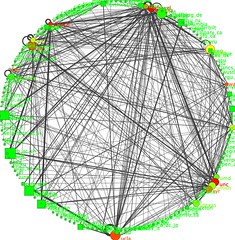Okay, so maybe it wasn't really under the radar. ;-)
So what is this science of networks? I thought maybe there'd be something on the Commandant's Reading List; couldn't find it, but it turns out there is a book by Albert-Laszlo Barabasi: Linked: The New Science of Networks.
Since I don't have the book, I did the next best thing: Google.
Here's a the lede to a review at Andreas.com:
Albert-Laszlo Barabasi's book on the theory of networks shows that networks (social network of friends, the web's five billion websites, the biological food chain, business and commerce, the growth of cities, intra-cellular proteins, and so on) can be quantified and described with the same type of mathematical laws. These different types of networks share the same properties. By understanding how networks function and grow, one can develop strategies to take advantage of that growth.Andreas has done a great job highlighting the high points.
Here's a bit more from The Science Show's The New Science of Networks. Or try NetWiki, a "space for collecting data and collaborating on research about complex networks and applications of network science." Or a little something from Amsterdam.
And then, across my RSS reader, came this jewel from APQC: The Growing Popularity of Social Networking and Expertise Location.
Inside organizations, social networking tools are often used to enhance communication among employees. Staff members leverage social networking applications to learn more about each other, including background information such as job histories and personal interests. When employees have access to this kind of detailed data, conversations become more valuable. Some organizations also employ social networking to help identify experts in specific topic areas.Time to get onboard. Time to learn more.





No comments:
Post a Comment